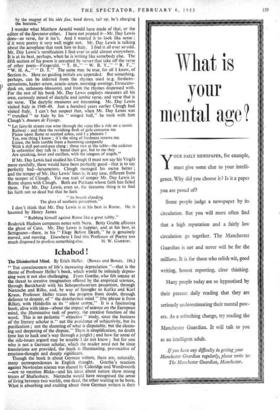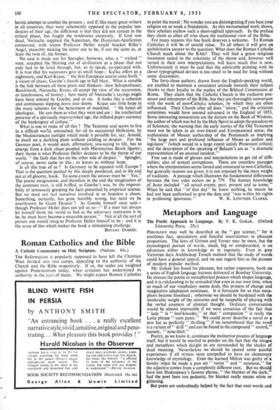Ichabod !
The Disinherited Mind. By Erich Heller. (Bowes and Bowes. 18s.) " THE consciousness of life's increasing depreciation "—that is the theme of Professor Heller's book, which would be infinitely depres- sing were it not also challenging. From Goethe, who felt uneasy at the threat to creative imagination offered by the empirical sciences, through Burckhardt with his Schopenhauerian pessimism, through Nietzsche and Rilke, and, by way of Spengler to Kafka- and Karl Kraus, Professor Helier traces the progress from doubt, through defiance to despair, of " the disinherited mind " (the phrase is from Rilke), with HOlderlin as its " silent centre." It is a fascinating book, alive with ideas—about the impact of science on the European mind, the illuminative task of poetry, the creative function of the word. This is no pedantic " objective " study, since the business of the literary scholar is " not the avoidance of subjectivity, but its purification ; not the shunning of what is disputable, but the cleans- ing and deepening of the dispute." There is simplification, no doubt (one has to hack one's way through a jungle) ; and how far some of the side-issues argued may be tenable I do not know ; but for one who is not a German scholar, which the reader need not be since translations are provided, the book is illuminating, provocative of emotion-thought and deeply significant.
Though the book is about German writers, there are, naturally, many correspondences in English thought. Goethe's reaction Ftgainst Newtonian science was shared by Coleridge and Wordsworth —not to mention Blake—and his ideas about nature show strong traces of Shaftesbury. Nietzsche would have recognised the sense of living between two worlds, one dead, the other waiting to be born. What is absorbing and exciting about these German writers is their heroic attempt to combat the process ; and if, like many great writers in all countries, they were vehemently opposed to the popular ten- dencies of their age, the difference is that they did not remain in the critical phase, but fought the tendencies creatively. If God was dead, Nietzsche supplied the Superman, the Dionysian-Apollonian compound, with whom Professor Heller would bracket Rilke's Angel, plausibly making the latter out to be, if not the same as, at least the twin of, the former.
No case is made out for Spengler, however, who, a " wicked " man, accepted the blotting out of civilisation as a phase that not only had to be lived through, but, so to speak, co-operated with. It is true that his successors give us small hope ; Kafka offers us a nightmare, and Karl Kraus, " the first European satirist since Swift," a vision of chaos, Goethe's fourth age in full blast. What is notable is the link between all these poets and thinkers—how Schopenhauer, Burckhardt, Nietzsche, Kraus, all accept the view of the recurrence, or timelessness, of history how many of Nietzsche's sayings might have been uttered by Goethe, and so on. It looks like a coherent and continuous slipping down into doom. Kraus saw little hope in the many schemes for the betterment of mankind. " He hated all ideologies. He saw them as what they were and are : the intellectual pretence of a spiritually impoverished age, the inflated paper currency of the bankruptcy of culture." What is one to make of all this ? The Teutonic soul seems to live in a difficult world, untouched, for all its occasional Hellenism, by the Mediterranean sunlight which made it possible for, say, Arnold, to dwell on a darkling plain without yielding to despair. For the German poet, it would seem, affirmation, yea-saying to life, has to emerge from a dark chaos peopled with Hieronymus Bosch figures ; their theme is what Professor Heller declares to be the theme of our world, " the faith that lies on the other side of despair." Spengler, of course, never came to this ; so leaves us without hope. Is all this true of us ? Is Germany to be equated with Europe ? That is the question posited by this deeply pondered, and in the end not at all gloomy, book. To some extent the answer must be " Yes." The poetic imagination, and therefore in the end the imagination of the common man, is still baffled, as Goethe's was, by the impossi- bility of sensuously grasping the facts presented by empirical science. But we need not feel ourselves involved in so hopeless a chaos. Something, certainly, has gone horribly wrong, but need we be overthrown by Giant Despair ? As Goethe himself once said— though Professor Heller does not tell us so—" If a man has always let himself think the world as bad as the adversary represents it to be, he must have become a miserable person." Not at all the sort of person one would imagine Professor Heller himself to be ; and it is the sense of this which makes the book a stimulating challenge.
BONAMY DOBREE.



































 Previous page
Previous page